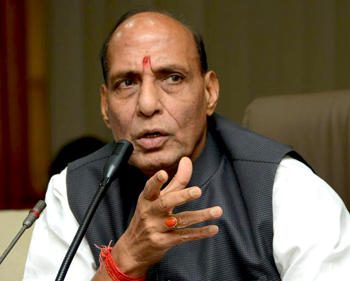Lucknow/Srinagar/New Delhi, Aug 23: The cancellation of the NSA-level talks by Pakistan is "unfortunate", Union home minister Rajnath Singh said in Lucknow on Sunday and made it clear that the possibility of any future dialogue will depend on the neighbour.

He underlined that India stands for dialogue and cordial relationship with Pakistan, a day after the talks between NSA Ajit Doval and his counterpart Sartaj Aziz were called off.
"The cancellation of NSA-level talks between India and Pakistan is unfortunate. India is in favour of dialogue," Singh said on the sidelines of a function at Sanskrit Vidyapeeth here.
On Pakistan blaming India for cancellation of talks, the home minister said, "It is Pakistan which has cancelled the talks and not India."
He said that India has always been of the view of maintaining good and cordial relationship with the nighbours and its efforts would continue.
"But Pakistan should not have deviated from the agenda decided during the meeting between Prime Minister Narendra Modi and Pakistan Prime Minister Nawaz Sharif (in Ufa in July)," he said.
On Pakistan's criticism of India's objections to Aziz's meeting with Kashmiri separatist leaders, Singh said, "The thing was that there will be no third party in NSA-level talks. It was only NSA-level talks. There was nothing like that others too will hold talks before, later or in between."
He said Pakistan should have held talks as per pre-decided agenda.
On Pakistan's claim that Kashmir was the main agenda, the home minister said, "... then why was it not decided earlier that when it would be part of NSA-level talks? It was never an issue on agenda."
India has maintained that terror was the only agenda on the talks between the two NSAs.
Asked about possibility of any dialogue in future, Singh said, "go and ask Pakistan, how can I reply to it.
Separatists accuse India
Moderate Hurriyat Conference leader Mirwaiz Umer Farooq said calling off of the talks was unfortunate.
"Yet another opportunity lost by both the countries to engage with each other. The last nail in the coffin was put by external affairs minister Sushma Swaraj when she made it clear that there will not be any talks on Kashmir. Instead of moving forward, we are only moving backwards," he said.
He regretted that the BJP had assured, along with its ally PDP, that they would talk to all shades of opinion. "I think there is a lot of difference in what they say and what they do," the Hurriyat leader said.
He hoped a better sense will prevail and the government will discuss Kashmir with Kashmiris.
Another separatist leader Shabir Shah, who continues to be under house arrest at the guest house in south Delhi, said he was disappointed that the talks had been cancelled.
"I wish the government had not put any conditions to Pakistan ahead of talks," he said.
Hardline Hurriyat Conference, headed by Syed Ali Shah Geelani, also termed the cancellation of NSA talks as unfortunate but said "at the end of the day, it is a diplomatic victory for us as well as Pakistan".
Ayaz Akbar, the spokesman for the hardline group, said, "A message has gone to the world that Kashmir issue is not a bilateral territorial dispute between India and Pakistan and that people of Jammu & Kashmir are the principal party to it. The fanatic approach adopted by government is not practicable. How long will New Delhi pursue this policy?"






Comments
Add new comment